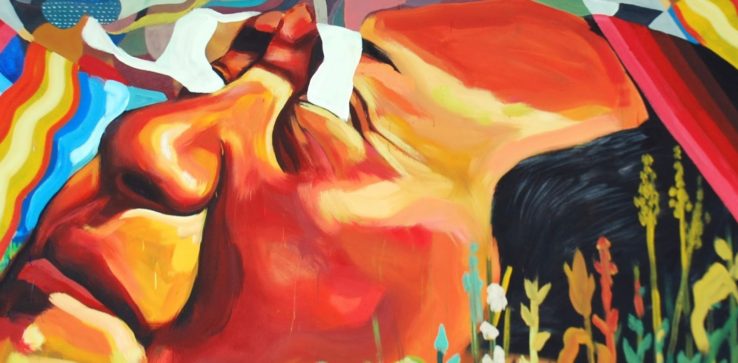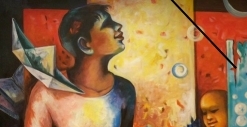The simple act of living in Israel has a heroic dimension to it. You have had rockets fly over you, you have lived through times when buses were exploding daily, you have served in the army, you know your children will. Islamism, terror, jihad are not just disturbing news from far away lands. It’s the crust of day-to-day life in Israel. Retired immigrants discussing the stability of Egypt’s government and their ability to fight terrorists in the Sinai Peninsula. Teenagers taking up endurance training during the summer vacation, so that they would be selected to army’s special forces. This is how normal life looks here.
Why do young American Jews come to Israel to serve in the Israeli army? Surely, being a part of an affluent Jewish community in America offers more opportunities to being a lone immigrant in Israel. They come because they are led by the romance and promise of heroism. The moral imperative of reuniting with your people in their historic homeland has a psychological drive: the wish to serve something that is bigger than you.
To add a heroic dimension to your life, normally one has to work hard. Write a book, become an activist, start a company. Most people live without it, wrapped in the safe, bland cocoon of their little world. In normal countries, the kind of hardships and challenges that people have to overcome daily are mostly personal and familial. Job security, kids education, health problems. There is little heroism in this – you do all of this to better yourself and your family. There is a place for courage and stoicism in personal and familial, but sacrificing for your children or your future is still a largely selfish effort.
Compare this to the life on an average Israeli. Immersed in his day-to-day routine, his life may look just as unassuming. But don’t be mistaken – beneath the surface, his heart beats in tune with an ideological drive and sense of mission, that is uncommon for a modern person. Unlike his fellow Europeans or Americans, he isn’t just living a life through career and family. He is partaking in a historic mission of reuniting with his brothers and ensuring the future of the Jewish nation. Surely there are cynics, but for many, living in Israel is a historic answer to the Holocaust and centuries of persecution.
On the one hand, this sense of common goal and unique mission unites Israelis, that are otherwise divided by country of origin and socio-economic status. It fosters a sense of solidarity, closeness and altruism. One of the things we love to tell about ourselves is the story of a stranger lying on a street. In Israel, the story goes, dozens of passers-by would immediately stop and check up on him, rushing him to the hospital if needed, while in America this person would lie there for hours, taken for a drunk homeless person. Never mind how closely this story reflects reality, this self-perception is telling us something about the sense of brotherhood shared by Israelis.
But on the flip side, this sense of heroic mission has some unsettling implications. Because heroes don’t contemplate, they act. Heroes don’t need facts, they have an ideology. Heroes don’t have doubts, they have a righteous anger. And as the recent events have shown us, heroic attitude coupled with an ideology can be a deadly force for a society.
Ernest Becker, in his excellent book “Escape from Evil” argues that every conflict over truth is a struggle over immortality, and that the hero is someone who is ready to sacrifice his life to gain immortality.
Each person nourishes his immortality in the ideology of self-perpetuation to which he gives allegiance. This gives his life the only abiding significance it can have.
For a hero, acting up on his ideals offers a principal way of ensuring a meaning to his life and a ticket to immortality. Yishai Shlissel, an ultra-Orthodox extremist stabbing gay-parade participants may seem a deranged lunatic, but to himself and to some in his community he is a hero, ready to sacrifice himself to stop the “spread of an abomination”. Those responsible for setting on fire a Palestinian house this week, and killing an infant, might have acted on the same basis of heroic dedication to an ideology, in this case, the promised land of Israel.
As a biological organism man is fated to perpetuate himself and as a conscious organism he is fated to identify evil as the threat to that perpetuation… If we add together the logic of the heroic with the necessary fetishization of evil, we get a terrifying formula. It explains why man, of all animals, has caused the most devastation on earth – the most real evil. He struggles extra hard to be immune to death because he alone is conscious of it. But by being able to identify and isolate evil arbitrarily, he is capable of lashing out in all directions against imagined dangers of the world.
This is a crucial point. Becker argues that the most real evil in the world is perpetuated by “heroes” against those identified as evil by their ideology. To the Nazis, Jews have symbolized pure evil, and the final solution sought to purify the land from their “filth”. Most of the nazi criminals weren’t monsters or psychopaths. They were regular people, indoctrinated with a vicious fetish for evil (and an organized machine for carrying out their preferred purification).
Religious extremists such as Shlissel, or messianic settlers carrying out attacks against Palestinian civilians aren’t deranged sadists. They are normal individuals that identify evil according to their ideology, and take it upon themselves to rid the world of it. Jews, homosexuality, Palestinians represent a cosmological evil in their respective ideologies, whose existence prevents the appearance of their prefered utopia, be it a 1000-year Reich, a halachic state governed by biblical law or a Greater Israel (Eretz Yisrael Hashlemah).
…The hero can appease the gods by offering to them the sacrifice of the stranger. He kills those who threaten his group, he incorporates their powers to further protect his group. In a word, he becomes a saviour through blood.
While it’s tempting to paint the recent events as singular crimes, they serve as a good reminder of the dangers of heroism. Israel, a country that was built through individual and collective sacrifice, has a complex relationship with heroism, making us possibly more susceptible to the romantic ideal of becoming “a savior through blood”.
But it’s about time we parted with our messianic heritage. No more heroes, no more partaking in a communal project that demands sacrifice and loyalty. A regular life, devoid of ideology. Selfish, self-serving. Army service as a bitter necessity, not a sacred duty. A government that works towards economic prosperity, not Jewish ethnic dominance. Ironically, this maybe the only thing that could save us in the long run.
The parents of Shira Banki, the 16-year-old girl killed by Shlissel, said it best:
If we will be more occupied by enjoying good food, drink and love and less by high principles, sacred lands and other ways of dominating and controlling the opinions and actions of others, than we all be much happier, and will be able to raise kids in a beautiful and safe world



I will totally agree with your propaganda if/when the other side will embrace it as well or at lest will accept the “European/american” ideology. Till then, what you suggest isn’t logical/possible in terms of existence.
And just FYI, there is a big difference, ( in addition to the frequency of the acts ) such acts are investigated and prosecuted ( in contrast to the other side, that in best are met with indifference )
Who is “the other side” in case of ultra-Orthodox fanatics like Shlissel killing an innocent girl? Who is “the other side” in case of extremists that dream of blowing-up Al-Aqsa mosque and build a third temple in its place?
Don’t you see that we are trapped here between fanatics on both side, and that the only way out is to recognize that “our” ideology, can be just as dangerous and destructive as “theirs”?
Well, I don’t think I really need to point out what is the other side exactly.
Currently, the other side is already destructive ( towards us ), ours is only a potential/possibility, so here another difference for you.
Another thing to think of: since the other side is already dangerous and destructive ( again to us ), I would pick the lesser of 2 evils, I would prefer to be dangerous and destructive towards the other side – strike fear into their hear as a meaning of self defense ( like all countries do )